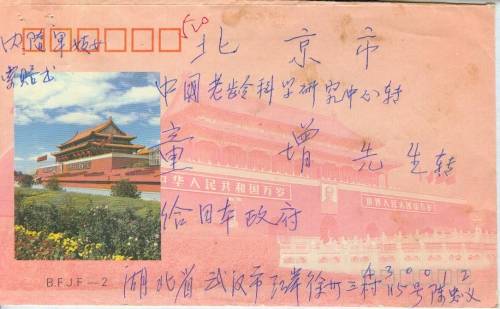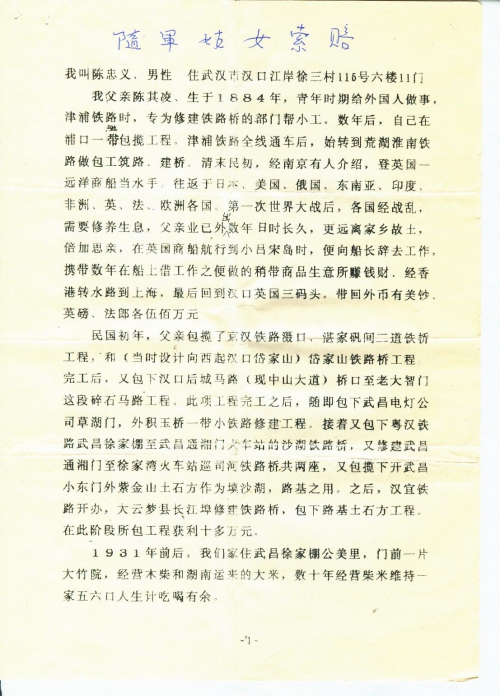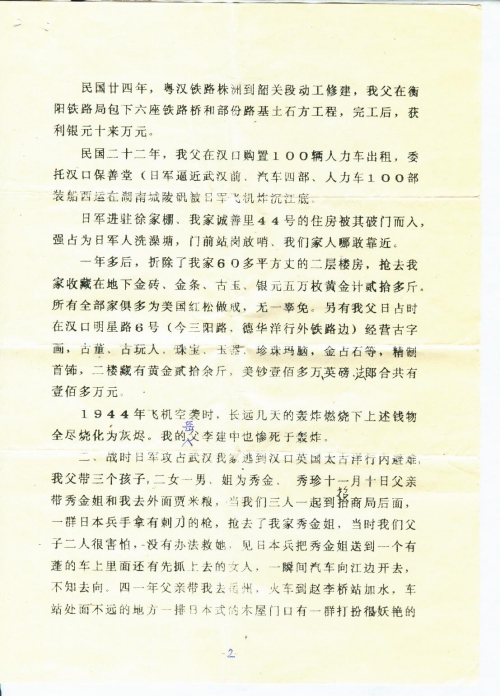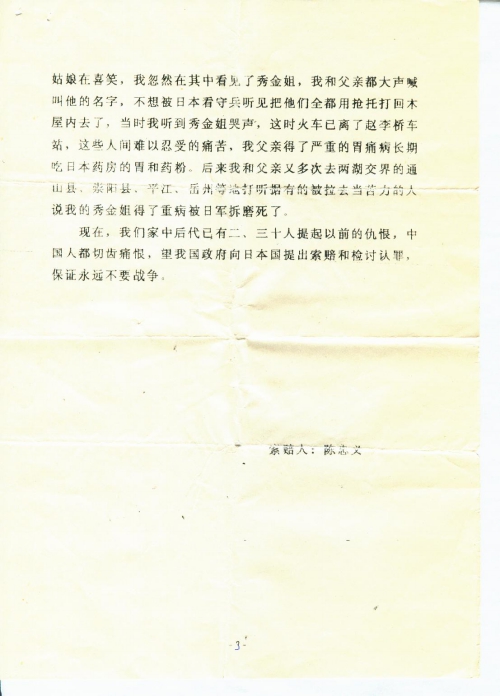Date of letter:Not mentioned
Address of author:Wuhan City, Hubei Province
Date of event:1933-1934, 1944
Location of event:Wuhan City, Hubei Province
Name of author:Chen Zhongyi
Name(s) of victim(s):The Chen Zhongyi family and Li Jianzhong (Chen Zhongyi’s father-in-law)
Type of atrocity:Others, Air Bombings, Sex Slaves(OT, AB, SS)
Other details:The Japanese army invaded my hometown and forcibly occupied our houses as the bathhouse for the Japanese soldiers. After more than a year, the Japanese soldiers demolished our storied houses and looted our belongings collected in our houses. In 1944, the Japanese soldiers bombed my hometown, and my father-in-law was killed in the bombing. The Japanese soldiers caught my elder sister and forced her to be a comfort woman. It was said that my sister got serious disease and was tortured to death by the Japanese soldiers. The Japanese government must make compensation and review the crimes.
Army Prostitute’s Claim for Compensation
I am Chen Zhongyi, male, and live in 6-11, No. 115, Xusan Villiage, Jiang’an, Hankou, Wuhan.
My father Chen Qiling, born in 1884, worked for foreigners when he was young and did chores for the department building Tianjin-Pukou railway. Years later, he began to undertake projects in Pukou. After Tianjin-Pukou railway was put into operation, he began to build roads and bridges along Huanghu-Huainan railway. In late Qing Dynasty and early Republic of China, thanks to the reference of someone in Nanjing, my father boarded a British ocean-going commercial ship and worked as a sailor. The ship took him to many countries and regions including Japan, the United States, Russia, Southeast Asian countries, India, Africa, Britain, France and European countries. After the World War I, the countries needed a rest. My father missed the family very much as he had been out for years, so when the ship sailed to Xiaolvsong Island, he quitted the job and went ashore with the money he earned from doing businesses on the ship by taking advantage of his position. He first reached Shanghai by waterway through Hong Kong and finally returned to the 3rd British pier in Hankou. He brought back foreign currencies in American dollars, British pounds and French francs, each 5 million yuan respectively.
In early Republic of China, my father undertook the Shekou-Zhanjiafan iron bridge project along the Beijing-Hankou railway and the bridge project along the Daijiashan railway (then designed to start from Daijiashan, Hankou to the west). After the projects were completed, my father undertook a gravel road project from the bridge of Houcheng Road (now Zhongshan Avenue), Bridge opening to Old Dazhimen. After this project was completed, my father undertook the small railway construction project in outer Jiyuqiao, Caohumen of Wuchang Electric Lamp Company. After that, he undertook the Shahu railway bridge construction project between Xujiapeng, Wuchang and Tongxiangmen Station, Wuchang along the Guangzhou-Wuchang railway and then the project of using the earth and stone of Zijin Mountain outside Xiaodongmen, Wuchang to fill lakes and roadbed. Afterwards, my father undertook roadbed and earth–and-stone work as part of the construction of a railway bridge at a pier of the Yangtze River in Dayumeng County due to the construction of Wuhan-Yichang railway. During this period, my father profited over 100,000 yuan from these projects.
In around 1931, my family lived in Gongmeili, Xujiapeng, Wuchang, with a large yard of bamboos in front of our house. My 5-or 6-member family lived an affluent life for dozens of years by selling firewood and rice transported from Hunan.
In the 24th year of Republic of China , as the construction of the Zhuzhou-Shaoguan segment of the Guangzhou-Wuchang railway started, my father undertook part of the earth-and-stone work of 6 railway bridges and some roadbeds in Hengyang Railway Bureau. After the completion of the project, my father profited over 100,000 silver coins.
In the 22nd year of Republic of China , my father purchased 100 rickshaws in Hankou to rent out and entrusted them with Hankou Maintenance Company. Before the Japanese army approached Wuhan, my father’s 4 automobiles and 100 rickshaws that were shipped to the west were bombed by Japanese planes under the river at Chenglingfan, Hunan.
After the Japanese army occupied Xujiapeng, they broke in our house and used it as a bathhouse. As there were Japanese soldiers standing guard at the gate, we dared not approach.
Over a year later, the Japanese army demolished our 2-floor building with an area of over 60 square zhangs (1 zhang is about 3.3 meters), and robbed it of our gold bricks, gold bars, jade, 50,000 silver coins and over 20 kg of gold that were buried underground. All of our furniture, mostly made of American pine, was also taken away. In addition, my father owned an antique shop at No. 6, Mingxing Road, Hankou (now Sanyang Road, near the railway outside Sino-German Store), selling items such as ancient calligraphy and paintings, antiques, jewelry, jade, pearls, agate and orante jewelry. Over 20 kg of gold, more 1 million American dollars, and a total of over 1 million British pounds and French francs that were hidden on the second floor.
During an air raid in 1944, all of the above property was burned to ashes in the bombing that lasted for days. My father-in-law Li Jianzhong was tragically killed in the bombing.
Additionally, when the Japanese army occupied Wuhan in the war, my father fled to British Taigu Store Taikoo Company in Hankou for shelter by taking 3 children along including older sisters Xiujin and Xiuzhen and me. On November 10, my father went out to buy rice with me and Xiujin. When we reached the back of Merchants Company, a group of Japanese soldiers, armed with bayonets, took my older sister Xiujin away. My father and I were very frightened and couldn’t save her. We saw the Japanese soldiers taking Xiujin in a covered car where there were other captured women and driving toward the river and we didn’t know where it went. In 1941, my father took me to Yuezhou. The train stopped at Zhaoliqiao Station for water refill. We saw a group of seductively dressed girls laughing in front of a row of Japanese wooden houses not far from the station. I suddenly saw my older sister Xiujin. Both my father and I shouted her name. Unfortunately, a Japanese guard heard us and pushed them back in the houses with the gun butt. I heard my older sister Xiujin crying. At that time, the train had left Zhaojiaqiao Station. How unbearable the suffering was! As my father suffered from a serious stomachache, he had to take medicine from Japanese drugstores over a long period of time. Later, my father and I went to places at the border of Hunan and Hubei such as Tongshan County, Chongyang County, Pingjiang and Yuezhou for multiple times to get information about my older sister Xiujin from slave laborers. According to some laborers, she got a serious disease and the severe treatment lead to death by the Japanese army.
Today, in my family 20 or 30 people havementioned of the past suffering and hate. It makes all the Chinese people gnash their teeth in anger. We hope that the Chinese government will demand an apology and compensation from Japan and make Japan ensure that it will never launch a war again.
Claimant: Chen Zhongyi

















